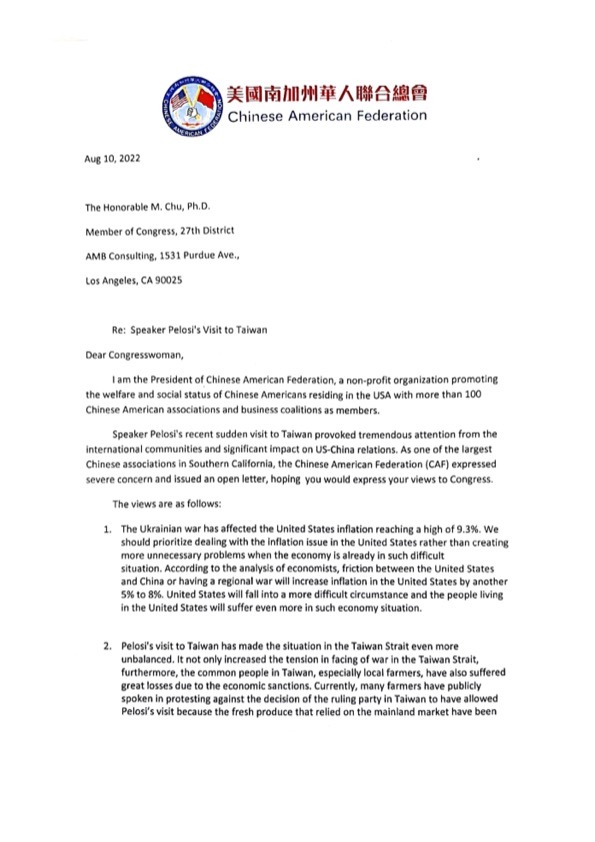CAF’s Open Letter on Speaker Pelosi’s Visit to Taiwan
Speaker Pelosi’s recent sudden visit to Taiwan provoked tremendous attention from the international communities and significant impact on US-China relations. As one of the largest Chinese associations in Southern California, the Chinese American Federation (CAF) expressed severe concern and issued an open letter as well as letters to Congresswoman Judy Chu and Congressman Ted Lieu, hoping that they would express their views to Congress from the perspective of safeguarding the sound development of US-China relations and protecting the interests of Chinese in the United States.
The CAF issued an open letter expressing concern on Speaker Pelosi’s visit to Taiwan. The views are as follows:
- The Ukrainian war has affected the United States inflation reaching a high of 9.3%. We should prioritize dealing with the inflation issue in the United States rather than creating more unnecessary problems when the economy is already in such difficult situation. According to the analysis of economists, friction between the United States and China or having a regional war will increase inflation in the United States by another 5% to 8%. United States will fall into a more difficult circumstance and the people living in the United States will suffer even more in such economy situation.
- Pelosi’s visit to Taiwan has made the situation in the Taiwan Strait even more unbalanced. It not only increased the tension in facing of war in the Taiwan Strait, furthermore, the common people in Taiwan, especially local farmers, have also suffered great losses due to the economic sanctions. Currently, many farmers have publicly spoken in protesting against the decision of the ruling party in Taiwan to have allowed Pelosi’s visit because the fresh produce that relied on the mainland market have been stranded at the port, directly returned, or even discontinued. Most people in Taiwan do not think Pelosi’s visit has brought any benefits to Taiwan.
- In 1972, the United States recognized one China. Taiwan and the mainland are all among China’s territory. Since the United States believes in the one-China principle, it should avoid any hope of Taiwan independence for the ruling party in Taiwan rather than visiting Taiwan at this critical moment.
- The freedom of the media in the United States allows us to see the immediate and direct global responses, especially European countries, to Pelosi’s visit to Taiwan. Globally, only the United States and Japan condemn China. Statements and signals sent by other countries are all in hoping to emphasize on the security of the Taiwan Strait as the starting point, and to handle various existing conflicts peacefully and rationally, rather than deliberately creating conflicts. Thus, most national leaders do not acknowledge Pelosi’s visit to Taiwan.
- According to the recent statement by the Democratic Senator and former Ambassador to China, Max Baucus also opposes Speaker Pelosi’s decision to visit Taiwan. He views this being a reckless and irresponsible act as Speaker Pelosi is not an ordinary visitor. Visiting Taiwan in her personal capacity artificially created a tense situation in Taiwan Strait. It also leaves the Chinese government no choice but to take retaliatory actions, and Taiwan’s future has also been accelerated into an uncertain track.
- As a result of Pelosi’s visit to Taiwan, a series of communication obstacles have also been created directly between the United States and China. As two superpowers leading the world, such obstacles are extremely terrifying and dangerous, and will also significantly and negatively impact the relationship between the two countries.
Chinese America Federation
August 10, 2022





















